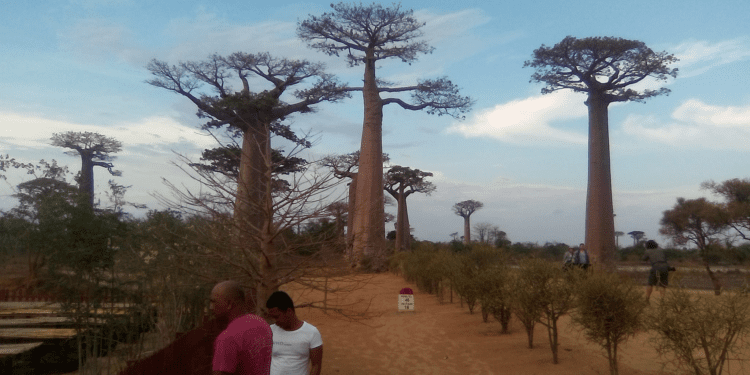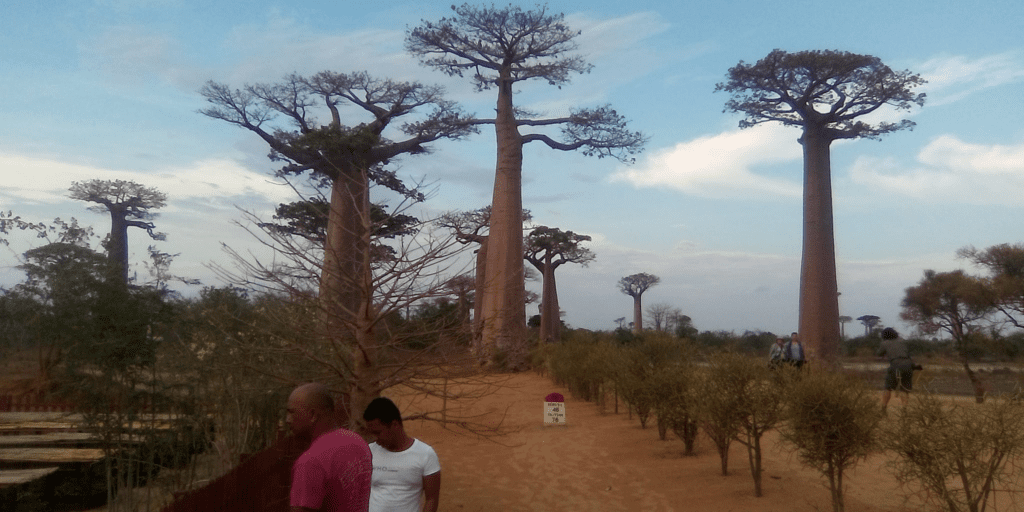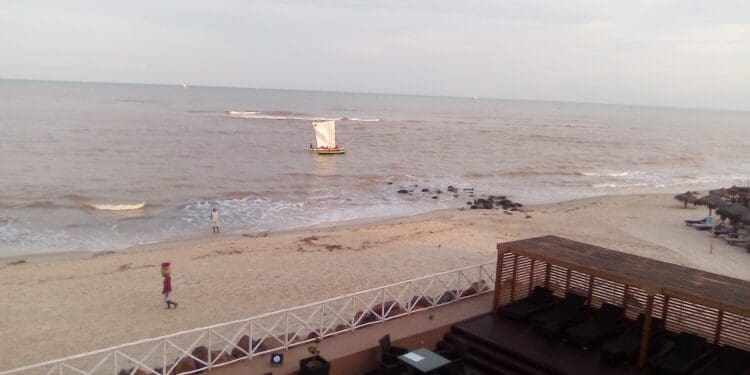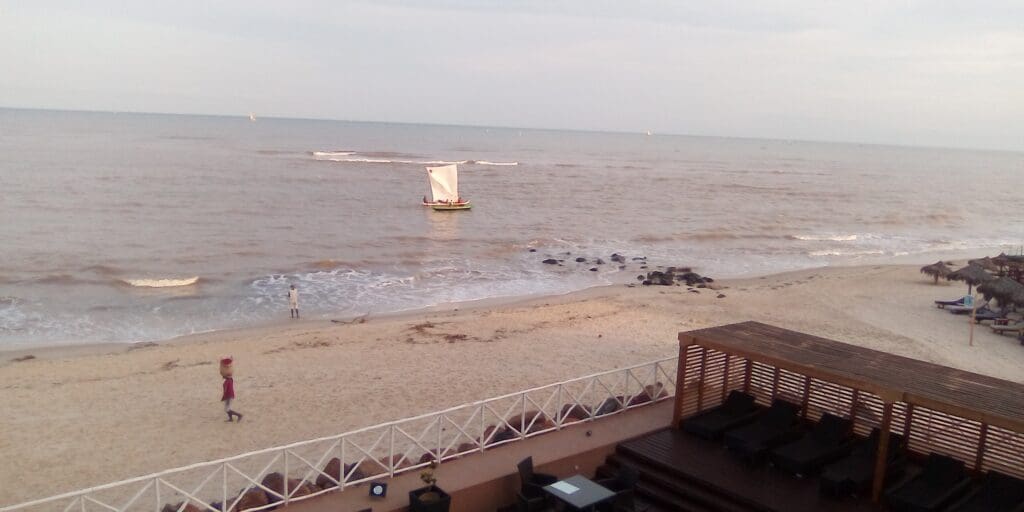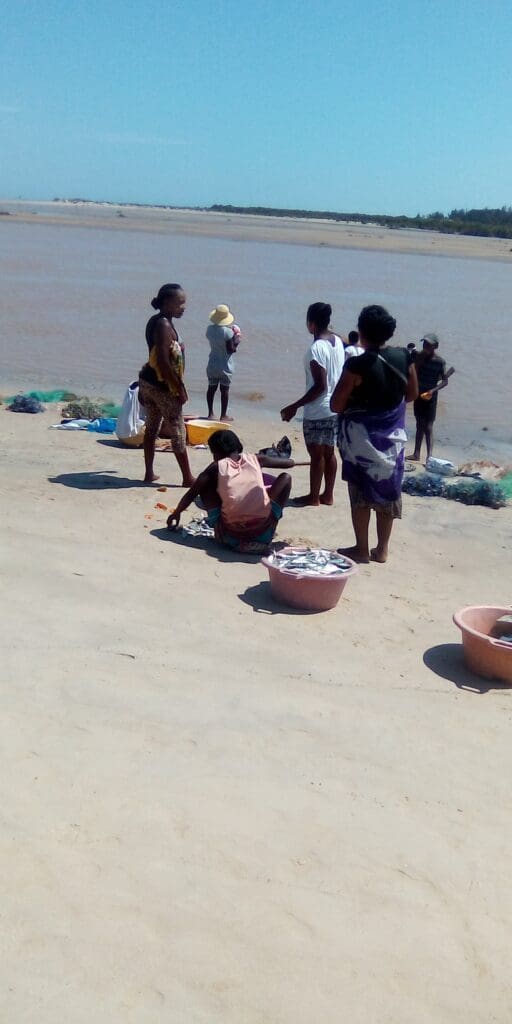Saturday in Betania, Madagascar
We had our first workshop today in Betania (not Bethany, as I thought was the name). We were delayed in getting to a spot we could get to our little ferry boat on the low tide, then had to move venues in the town so we could use the computer for a slide presentation, then had to bag using the projector and just use the computer due to the light. Once we got down to business, it went very well.
Most of the men were out fishing, so it was me and the women who process and market the fish. So, we talked about the fish business and fish products. There was keen interest in canning and salting fish to preserve it in lieu of refrigeration, so we’ll work on putting these practicals together.
Once we start in on the workshops, I sometimes wonder if I’m teaching my participants anything or it’s me that’s doing all the learning. Either way, the more we talk, the more we learn from each other about our respective fish businesses, and that’s what the point of the farmer to farmer program is, I think. The women in the room certainly knew their business. I left them with 3 cans of smoked coho salmon to try that I bought from Chris, and that was greeted with approval and gratitude.
This is the first place I’ve been where salt is easy to get and relatively cheap as there’s a salt mine or salt manufacturing nearby, according to Zo. And when we were waiting on one of the docks for the ferry pickup, there were 50 kilo bags stacked on the dock. When (and sadly, if, these days) the fishermen bring in more fish than they have capacity to smoke to fulfill a contract with a local buyer, the women can salt the excess fish to keep it until they have room in the smokers, and then slack the fish out in freshwater for half a day to freshen it before putting it in the smoker. It seems I always start out these assignments with trepidation about having enough material or practicals to cover, and then seem to find out where we can find something new to do together – that might be new to both parties – and move the learning on both sides forward. That’s the case with discovery that cheap salt is available here, and I’m excited to salt fish like they did for centuries before refrigeration.
I also found out they do have access to ice. Again, more surprises. They can make fish as good as I do. The ice will just melt faster!
Mangos are ripe and everywhere. I bought 5 yesterday for 50 cents. I stopped at 3, eating the smaller ones, and saved the two big ones for today. I remember gorging on mangos in Sierra Leone and getting a side ache like after eating too many green apples as a kid, only at the time I wasn’t sure if it was a side ache or appendicitis, and remember the relief when the ache went away as I was a long way from medical help in my Peace Corps village – just like everyone else who lived there was.
We went to dinner when we got back at about 730 pm. As we walked down a little breeze way from the street to the restaurant, we passed by a woman with a good size orange rockfish-looking fish, apparently looking to sell it to the restaurant. The fish was stinky, as it wasn’t iced and may never have been since it was caught. I had a nice local beef (Zebu) Malagasy dish with large beans over rice. I’ve tried fish here a few times, and don’t particularly like they way they cook it. Lots of local beef and pork and chicken to choose from, and that I have liked.
We got a good little thunderstorm come in and dump a bunch of rain. It started just as we finished dinner about 830 and lasted an hour, or maybe less.
After a week here, we finally got rolling yesterday with our first real workshop, and now we have tomorrow off. Africa time.
I’m up early this morning as I seem to do when I’m on these assignments, and listening to the Mississippi State football game, streaming XM radio through my phone on the hotel wifi. Still a wonder and contradiction to watch fishermen leave the beach under sail in dugout canoes and listen to a football game half the world away.
Friday in Morondava, Madagascar
We arrived in Morondava, Madagascar a few days ago from the capital, Tana. A 3 hour ride to Antsirabe through endless agriculture fields worked by hand, a very cool town where we had rooms overlooking the town square, which is not square but a big long oval. The roads here are very narrow. Not room enough for 2 semi trucks with trailers to pass I don’t think. The next 11 hours were through scrub and high arid country, a good 8 to 9 hours of it on poor roads. Did not pass many vehicles this time of year. Much less population and seemed to be mostly cattle herders here. Not much wildlife – a few birds and lizards. When we dropped out of the highlands to the coastal plain, we stopped for lunch. Local tilapia from the river nearby. Not bad. Malagasy food is not very spicy – much unlike West Africa foods.
Our hotel in Morondava is right on the beach, and we can watch the fishermen leave in their brightly colored canoes starting at 3 in the morning, and then return all day. Many of the canoes are rigged with sails and an outrigger on one side. The boats just glide through the water.
We went to Bethany yesterday. We had to cross a small shallow river, and went by a motorized canoe. On the way back, we waded half way across the river because it was low tide, to an island in the middle, then the canoe took us the rest of the way. It was not a far crossing, nor dangerous.
Our meeting with the fishing families went well. We went through the usual feeling out of each other. After asking for a freezer and outboard motors, neither of which I happened to have in any of my pockets, we got more comfortable with each other and I started to ask them about their fishing operations, their fish processing and fish selling, the type of smoker they use, prices they get for the fish they sell, how they decide what fish to smoke and what fish to sell fresh, etc., etc. It was a very productive meeting for me. I often – I’ll say always- come into these assignments with a lot of trepidation – am I going to be able to provide any real advice to the peopleth hosting me? – and always I find I can and the trepidation turns into a sort of – high?- maybe? – putting together slides on the computer to talk about. Often I find my brain outpacing the speed of my typing. Sometimes I’ll just put down the subject ideas in rapid fire so I don’t forget them and come back and fill in the blanks.
The meeting ended in the early afternoon, and it was hot. Real hot. The normally stiff ocean breeze had laid down. The sand was so hot I could not walk on it in bare feet. My supervisor (Zo) and translator (Andry) accompanying me were as hot and worn out as I was when we got back, which gave me a little solace. Zo had proposed at the meeting we go out fishing all day with the men and then have a workshop in the afternoon. I think we all saw that might kill us………
I was so hot when I got back I stripped off my skanky clothes, and put them in the sink to hand wash. It’s relatively dry here so the clothes dry quickly on the veranda. I put the shower on the coldest setting, which of course was not very cold, and it was just enough to take the edge off. I then crashed for a long nap to recover.
Today, we went to a second village where we’ll work next week, just to see it. We drove as far as we could, then hiked maybe a quarter mile down to the beach. Fishermen passed us with their small gillnets draped over their canoe paddle that they carried on their shoulder.
We watched a couple fishermen skillfully surf their canoes to the beach. Women then helped to get the fish out of the boats. Men fish. Women process and sell the fish. Neither does the other job from what I can tell. One of the women came over with a mackerel looking fish about 15 inches long, and a couple smaller fish to see if we wanted to buy any. We didn’t, but were able to engage her about the price of fish. From what we could tell, the price of mackerel – which she said is rare now – was about $1.75/lb. Which is a good price to fishermen for whole fish of many species in Alaska. Of course, that’s the dock price, and not what it would cost in a store or further down the supply chain. Great information.
The woman returned to the boat to help offload the boat. A young girl of maybe 3 years old was out playing in the heavy surf. Having the time of her life. Laying down and body surfing and just bopping around like 3 year olds everywhere do. Her mother chastised her several times to come in from the surf, but the girl kept playing as long as she could get away with it.

